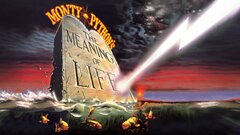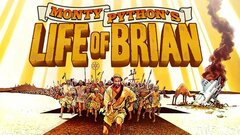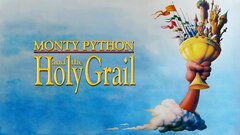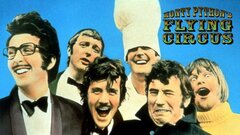On the surface, Graham Chapman seemed the sanest of Britain's Monty Python troupe - he was tall, well-spoken and apparently possessed of refined manners. That veneer soon fell away within minutes of the launch of a sketch, whereupon Chapman would erupt into arias of mad behavior that skewered not only his own appearance, but the staid gentility of England's upper class.
He found that streak of inspired insanity while a student at Cambridge, and with fellow alum John Cleese, began contributing to UK television and radio comedies. In 1969, he and Cleese teamed with Eric Idle, Michael Palin, Terry Gilliam and Terry Jones to form Monty Python, an unbridled comedy troupe whose stream of consciousness approach would have a lasting impact on world humor for decades to come. Chapman remained with Python until his untimely death in 1989, which robbed audiences of one of the most irreverent minds in entertainment.
Born Graham Arthur Chapman in Leicester, England on Jan. 8, 1941, he was the son of a police constable, who according to accounts of the actor's life, took his son to the site of a grisly plane crash when he was only three years old. He gained his initial taste for performing while a student at Melton Mowbray Grammar School, and joined the legendary Footlights Dramatic Club while studying medicine at Cambridge University's Emmanuel College.
While a member, he became acquainted with John Cleese, who initially took a disliking to what appeared to be Chapman's lack of focus - he was constantly late to writing sessions, where he frequently drank and smoked pipes while offering unusual ideas. In later interviews, Cleese stated that Chapman's greatest contribution was what he deemed an unerring knack for the absurd; it was Chapman who suggested that a sketch about a faulty toaster be changed to one about a dead parrot, which eventually gave rise to one of Python's most memorable sketches.
Chapman left Cambridge in 1962 to continue his medical studies at St. Bartholomew's Hospital in London, but his training would soon come to an end. The Footlights' revue "A Clump of Plinths" enjoyed such success at the Edinburgh Fringe Festival that it was transferred to the West End in 1963. Chapman rejoined the show - which was renamed "Cambridge Circus" - in 1963, but faced a serious predicament the following year when it was invited to tour New Zealand.
Chapman apparently took up the matter with the Queen Mother, whom he met as the secretary of the students' union at St. Bartholomew's, and took her admonition to visit the country as the signal he needed to put his medical studies on hold. Chapman later performed with the Circus on Broadway and "The Ed Sullivan Show" (CBS, 1948-1971) in 1964. The original troupe also wrote a popular radio series called "I'm Sorry, I'll Read That Again" for the BBC Home Service (later BBC 4) which ran from 1964 to 1973.
Upon his return to England, Chapman divided his time between medicine and writing and performing for various radio and television programs in the mid- to late 1960s. With Cleese, he penned sketches for David Frost's various shows, including "The Frost Report" (BBC, 1966) and "At Last the 1948 Show" (ITV, 1967-68), which gave Marty Feldman his first brush with fame. Chapman also wrote several episodes of the long-running comedy "Doctor in the House" (ITV, 1969-1991) and contributed sketches to variety series like "This is Tom Jones" (ATV/ABC, 1969-1971).
In 1969, Chapman and Cleese's work on "At Last the 1948 Show" earned them a shot at their own series with the BBC. At the same time, writer-performers Eric Idle, Terry Jones and Michael Palin, along with American animator Terry Gilliam had been offered their own series after earning critical acclaim for their own on the ITV children's series "Do Not Adjust Your Set" (1967-69). Cleese was reportedly ill at ease with the idea of a two-man series, especially in light of Chapman's erratic work habits, and suggested that Palin, with whom he had worked on "The Frost Report" be brought into the BBC show.
In turn, Palin suggested that Jones, Gilliam and Idle - with whom Cleese had performed in Footlights - be part of the new show as well. With all parties finally set - despite the ITV series already in production - the show, titled "Monty Python's Flying Circus" (BBC 1, 1969-1974) was launched in 1969.
While the show's stream-of-consciousness structure required each member to play any number of roles in a given episode, the Pythons played recurring characters and types throughout the series' run. Tall, stern-looking and blessed with a resonant voice, Chapman was frequently called upon to play authority figures, such as "The Colonel," a dreary military type who brought skits to a close for being too silly. However, Chapman's officers, policemen and barristers were also given to flashes of insanity that broke out at a moment's notice.
Chapman also excelled at sketches which required him to loose a volley of verbal abuse at his castmates; most notably in "The Argument Clinic," where Palin pays for the privilege of being screamed at by Chapman before realizing that he has signed up for the wrong service. Chapman's work as a writer for the series was also given to flights of lunacy - several of his sketches were deemed too graphic for use on the series; most notably, one about undertakers who suggest to their customers that the best manner of disposal for their loved ones was to eat them.
Still, it was Chapman's ability to find the most surreal aspect of a sketch that made him a valued member of the troupe.
The viewing public knew little about Chapman's private life until the early 1970s, when it became known that he lived with a domestic partner, writer David Sherlock. Chapman soon became a vocal advocate of gay rights, helping to co-found the publication Gay News in 1972. Chapman later took in a young homeless teenager, John Tomiczek, and adopted him as his legal son. Tomiczek later became Chapman's business manager.
Chapman's sexual orientation had little impact on the Python's creative output; when a viewer wrote to the troupe to express her outrage over Chapman's public declaration of his homosexuality in a television interview, Idle wrote back, stating that the others had "taken him outside and killed him." However, Chapman's drinking did have a detrimental effect on the Pythons. By 1971, he was unable to remember lines and suffered from tremors that halted production. His problems reached their zenith on the set of the Pythons' second movie, "Monty Python and the Holy Grail" (1974), where he found himself in the grip of delirium tremens. His instability came at a particularly inopportune time, as the group - which had officially ended its British television run in 1973 - was gaining popularity among American television audiences, thanks to broadcasts on public television stations.
Movies appeared to be the next logical step for the Pythons; after the disappointing release of their first effort, the sketch compilation "And Now for Something Completely Different" (1971), they scored a modest hit with "Holy Grail," and college audiences were gravitating towards their comedy albums. Chapman was front and center in "Grail" as King Arthur, and was poised to repeat his turn as a leading man for their next project, a Biblical satire called "The Life of Brian" (1979). A particularly disastrous interview for the British press prompted him to put the brakes to his drinking, so he was sober for "Brian's" location shoot in Tunisia in 1977.
In addition to his work with the Pythons, Chapman was busy with other projects through the 1970s and 1980s. After starring in and co-writing the Peter Medak comedy "The Odd Job" (1978), which cast him as a man who is unable to call off a hitman paid to kill his former lover, he relocated to Los Angeles, where he was a frequent guest on television shows, including a stint as host of "Saturday Night Live" (NBC, 1975- ) in 1981.
Chapman also toured college campuses throughout the 1980s, where he regaled audiences with stories about Python and some of his more outrageous friends, including Keith Moon, the notorious drummer for the Who. There were attempts to launch several series, including "Out of the Trees" (BBC, 1976), a short-lived collaboration with Douglas Adams of The Hitch-Hikers' Guide to the Galaxy fame. The duo also worked together on a program for Ringo Starr which never materialized. In 1980, Chapman published a memoir, A Liar's Autobiography, with four co-authors, including Sherlock and Adams. Though comically exaggerated in several passages, Chapman was also forthcoming about his struggles with alcohol.
Meanwhile, the Pythons' popularity continued unabated, and Chapman rejoined the troupe for two of its best-known and most controversial projects. "Live at the Hollywood Bowl" (1982) was a concert film shot in Los Angeles that featured the group reprising many of its most popular sketches. Chapman, who had joined a sort of proto-extreme sports group called The Dangerous Sports Club in the 1980s, looked remarkably fit for the first time on screen. The following year, Chapman co-starred and co-wrote "The Meaning of Life" (1983), which showcased some of their most shocking and subversive work Chapman contributed the film's closing sketch, "Part VII: Death," in which he played a man convicted of gratuitous sexual jokes who is allowed to choose his own demise: chased off a cliff by a team of topless women in crash helmets. One of the most popular of all Python film projects, "The Meaning of Life" would also serve as the last time all six members would appear together on screen.
The year 1983 also saw the release of one of Chapman's longest running projects - the comedy "Yellowbeard," which parodied Hollywood pirate adventures of the 1940s and 1950s. Originally intended as a film for Keith Moon, Chapman eventually took the lead role, but a troubled production - which included the death of friend and co-star Marty Feldman - resulted in a jumbled final effort that bore little resemblance to the script by Chapman, Sherlock and British comedy legend, Peter Cook.
He continued to work on television projects until the end of the decade, including an unsold pilot called "Jake's Journey" which also featured one of director Hal Ashby's last turns behind the camera.
In 1988, comedy fans around the globe were shocked to learn that Chapman had contracted a rare form of spinal cancer. By 1989, the cancer was deemed inoperable, but he pressed on, and filmed a cameo for a 20th anniversary Python special in September of that year. Chapman's condition worsened the following month, and he died on Oct. 4, 1989, with Sherlock and his friends from Python in attendance. His death occurred just one day short of the two-decade anniversary of Python's first broadcast on the BBC. In typical fashion, Jones later commented to the press that Chapman's timing had been "the worst case of party-pooping in all history."
Cleese delivered the eulogy for Chapman's memorial service at St. Bartholomew's in December of 1989, after which the surviving members joined in a rendition of "Always Look on the Bright Side of Life," Idle's irrepressibly cheerful closing song from "Life of Brian." Rumors abounded that Chapman's ashes had been fired into space by Sherlock in 1999, but in truth, the cremains - or a reasonable facsimile - were presented at subsequent Python reunions, most notably the 1998 Aspen Comedy Festival, where Gilliam knocked them over and later cleaned up the spill with a dust-buster. In reality, Chapman's ashes were spread in North Wales by Sherlock in 2005.
In addition to his enduring legacy as part of Monty Python, many of Chapman's sketch work were compiled in several book releases, and his college tours were presented on CD and DVD in the new millennium. In 1993, an asteroid between Mars and Jupiter was named in his honor.





















































![LIFE OF BRIAN, John Cleese, Michael Palin, Graham Chapman [Monty Python], 1979](https://media.baselineresearch.com/images/294803/294803_small.jpg)

















































